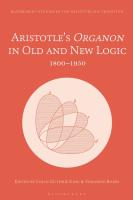Description
Aristotle's 'Organon' in Old and New Logic: 1800 -1950 explores the reception
and interpretation of Aristotle's logic in a time period which was crucial for the
development of modern logic. Authors investigate how Aristotle's logic played a
role in both the pre-mathematical or "old" logic and in the several strands which
would constitute a new algebraic or formal-semantic logic. The volume also includes
a translation of Olga Hahn's path-breaking dissertation, which sought to integrate
Aristotelian strategies of perfection into an algebraic representation of the syllogism.
This in-depth study of Aristotelianism covers logic in Kant and Hegel, together
with the problems and projects of interpreting Aristotle in the new logic after Boole
and Frege. Examination of modern debates concerning induction and abduction
offers further insight into Aristotelian logic during the period. By filling gaps in our
understanding of Aristotelian logic, this book not only provides a missing link in
21st-century studies of the history of Aristotelianism, but also sheds light on ancient
logic's role in the formation of modern logical theory.
Product Details
- Bloomsbury Academic Brand
- Feb 20, 2025 Pub Date:
- 1350372188 ISBN-10:
- 9781350372184 ISBN-13:
- 304.0 pages Hardcover
- English Language
- 9.21 in * 0.88 in * 6.14 in Dimensions:
- 1 lb Weight:




